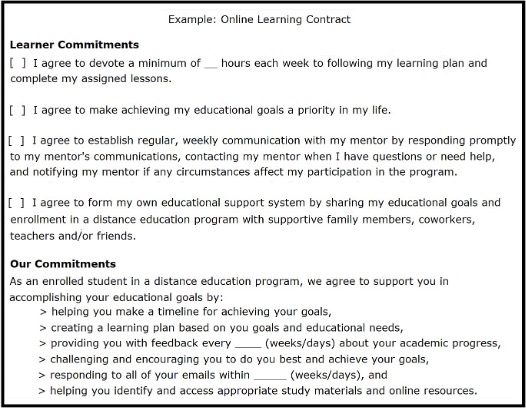Becoming an Effective Online Learning Mentor
by Katie Bratisax
With social distancing measures in place due to COVID-19, adult education programs face many obstacles in providing remote opportunities for learners. While equitable access to technology will continue to be a challenge for programs, the skillset used to support student learning and engagement online is similar to that which is used in a traditional classroom learning environment. The main difference is the method of communication.
Being an instructor can be both challenging and rewarding. Instructors use their knowledge and experience to help learners identify short-term and long-term educational goals, set learning expectations, and establish realistic timelines. An instructor also provides guidance, lends support, and encourages their learners. These are the same skills required for online instruction.
In order to effectively teach and mentor learners in an online environment, an instructor should get comfortable with technology and ensure that they have the prerequisite technology skills (Educational Technology Cooperative, 2006). These include:
- staying up-to-date on new adult education resources and online mentoring practices;
- being knowledgeable about online educational resources for their learners;
- being flexible and willing to embrace change;
- managing and monitoring students’ academic progress to ensure success;
- using effective motivational techniques to keep learners active and progressing toward their stated educational goals;
- assisting learners’ self-directedness and self-sufficiency through the communication of clear and challenging expectations, clear and concise instructions based on these expectations, and support for learners in meeting those expectations;
- incorporating instructional strategies to encourage active learning and participation in an online environment; and,
- understanding and responding to students with special needs in the online environment.
Another often overlooked but important issue for online teachers is that the delivery of courses is not restricted to a specific time or schedule (asynchronous). Because instruction does not start and stop at the same time for all students, time management skills are extremely important—not only for the online teacher, but also for students. Research shows that good time management skills are a major factor in learner success and that poor time management skills are given as a reason for dropping distance education courses (Miertschin, Goodson, Stewart, 2015). Online instructors can help develop these skills by providing learners with some tips for success. For instance, they should avoid distractions, set milestones towards goals, make lists, prioritize assignments, and reward themselves for accomplishments.
Communication is another vital component to the success of online learning. It is a way to bond with learners, share information, and provide support. In a traditional classroom, instructors can not only use words and body language to help convey the material, but they can also pickup on nonverbal cues from learners on how well they understand the material. Effective online instructors can learn how to identify electronic non-verbal cues (eNVC) such as:
- how learners perceive and value time, structure their time, and/or react to time (chronemics) through the timing, frequency, and pace of their postings;
- a lack of communication, which is a cue for showing discontent;
- two-dimensional visuals that learners use such as emoticons, illustrations, or profile pictures, which can demonstrate feeling or depth of engagement;
- electronic style, effort, expression, and tone of the learner, which can include things like punctuation, caps, shortened/quick answers, etc., to express thoughts and/or feelings.
Successful online instructors are also able to foster virtual communication by facilitating activities that allow learners to become socially connected with their peers and instructor(s) as well as establishing group “social presence” whereby participants feel comfortable projecting their personal characteristics into the group and presenting themselves as “real” (Al Tawil, 2019).
Effective online instructors must also possess the ability to prepare quality written communications. Appropriate and effective writing not only conveys information, it also encourages and supports learners. Additionally, to better help students, it is important that online instructors communicate in a timely and professional manner with each of their assigned online students.
A few communication examples include:
- Demonstrate responsiveness to learners by responding to emails and phone calls within a reasonable amount of time.
- Encourage and support learners becoming comfortable using electronic communications.
- Establish and observe specific times when learners may reach their online instructor via text, phone, email, or a preferred mobile app.
- Regularly monitor each learner’s completion of assignments and use of online programs, responding in a timely way with suggestions.
- Contact learners who have been inactive for a week or more via text, phone, email, or a preferred mobile app.
Learning remotely can be challenging for both the instructor and the learner. One way to manage these challenges is to define roles and responsibilities, for example, by creating an online learning contract (see example). This contract will help learners understand what is expected of them and what they can expect from their instructor with each party’s commitments being clear and concise. Another way to motivate learners is by creating certificates of achievement, which can acknowledge both short- and long-term accomplishments or even acknowledge a personal triumph.
Teaching remotely may be overwhelming and a struggle for some adult educators, especially those who enjoy the traditional classroom environment—the social interaction, the laughter, and the joy in a learner’s eye as they “get it.” It is important to remember that even though the delivery method might have changed, the connection and the bond between instructor and learner is still there and needs to continue. One way in which instructors can share the responsibility, motivate each other, and help overcome feelings of isolation is through a professional learning community (PLC). A PLC can help online instructors work collaboratively to share expertise, improve teaching skills and knowledge, and achieve goals. I leave you with this piece of advice: “trust in yourself, trust in your co-workers, trust in your learners, and trust that you are not alone.”
References
Al Tawil, R. (2019). Nonverbal communication in text-based, asynchronous online education. International Review of Research in Open and Distributed Learning, Volume 20, Number 1. Retrieved from http://www.irrodl.org/index.php/irrodl/article/view/3705/4961
Educational Technology Cooperative. (2006). Standards for quality teaching online. Southern Regional Education Board. Atlanta, GA. Retrieved from https://www.sreb.org/sites/main/files/file-attachments/06t02_standards_online_teaching.pdf?1459884276
Miertschin, S., Goodson, C., & Stewart, B. (2015). Time Management Skills and Student Performance in Online Courses. 122nd ASEE Annual Conference & Exposition. Seattle, WA.
 Katie Bratisax, M. Ed., is the Instructional Technology Specialist at the VALRC. In this role, she works with staff on technology-related issues and multimedia projects. She also manages the online facilitated courses and provides training on technology integration, distance education, and learning disabilities for teachers of adults in Virginia.
Katie Bratisax, M. Ed., is the Instructional Technology Specialist at the VALRC. In this role, she works with staff on technology-related issues and multimedia projects. She also manages the online facilitated courses and provides training on technology integration, distance education, and learning disabilities for teachers of adults in Virginia.
Learning Contracts
Self-Directed Learning: Learning Contracts
Create Contracts to Improve Communication and Reduce Anxiety

